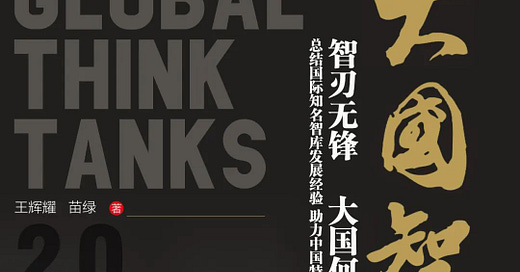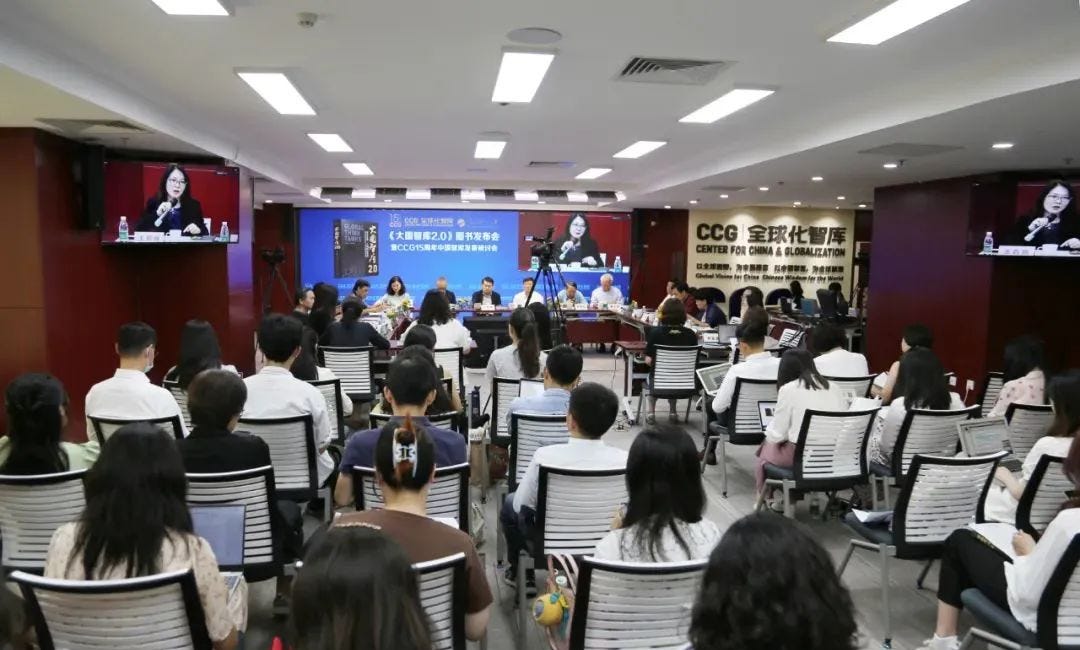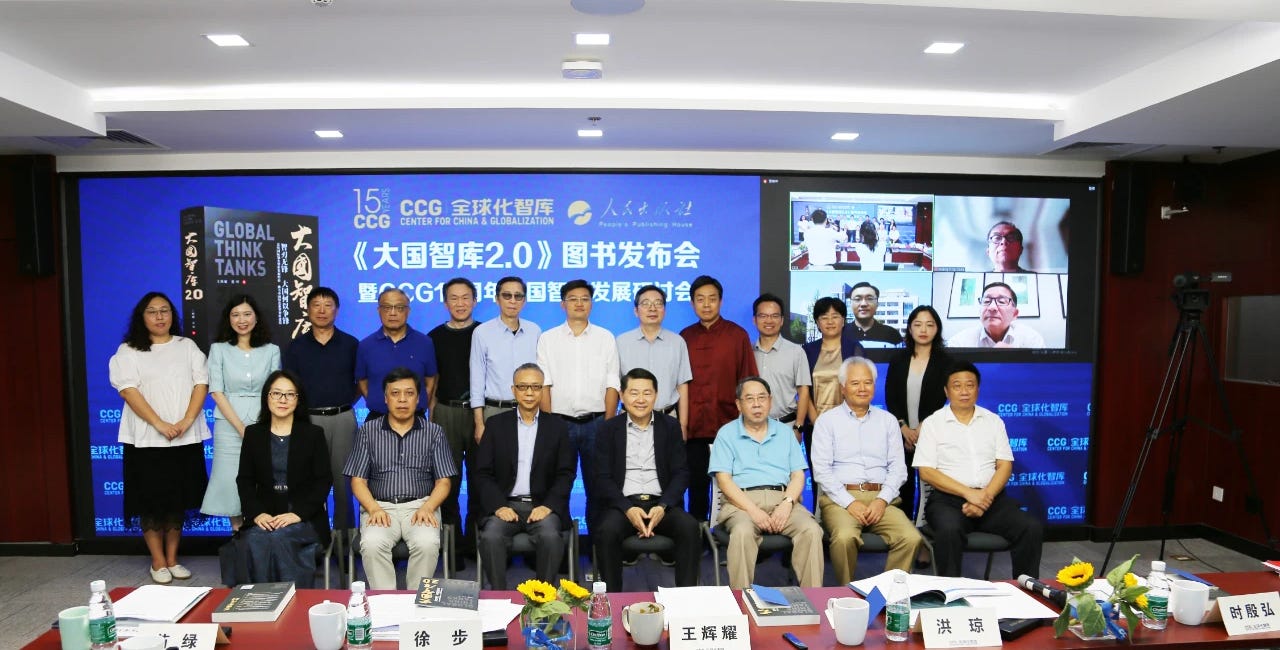Development Challenges facing Chinese Think Tanks: CCG book Global Think Tanks (2.0) excerpt
Lack of privatization, independence, and internationalization hampers think tanks‘ contribution to China, Henry Huiyao Wang and Mable Lu Miao write.
Our previous post, sourced from Global Think Tanks (2.0) by Henry Huiyao Wang and Mabel Lu Miao, of the Center for China & Globalization (CCG), provides an account of the various categories of think tanks in China, their distinctive features, and a brief historical overview.
Today, we are sharing the first part of 第七章 中国智库的发展挑战 Chapter 7: Development Challenges of Chinese Think Tanks, which Wang and Miao summarize as lack of privatization, independence, and internationalization.
Global Think Tanks (2.0) is published by 人民出版社 the People's Publishing House. A book release, hosted by CCG on August 18, 2023, featured a seminar of leading figures from Chinese think tanks.
第七章 中国智库的发展挑战
Chapter 7: Development Challenges facing Chinese Think Tanks
According to the "2020 Global Go To Think Tank Index Report," the Chinese mainland has over 1,400 think tanks, but only 8 of them are listed in the top 100 global think tanks. The highest-ranking one is the China Institutes of Contemporary International Relations (CICIR), which is only ranked 18th in the world. Although there is a large number of think tanks in China, they are "large in number but not strong in impact," and their ranking and strength on the international stage are severely disproportionate to China's national power and international status. Based on China's current strength, at least 20 seats in the top 100 global think tanks should be occupied by Chinese think tanks, and at least 2 of the top 10 should be from China.
Although these data and rankings may not be accurate, one thing is certain: to develop think tanks that match China's national strength, Chinese think tanks still need to work hard.
Three Major Deficiencies of Chinese Think Tanks
The development of Chinese think tanks is still immature, and all types of think tanks face their respective developmental challenges. There are many reasons for these challenges, but the most fundamental is the lack of privatization, independence, and internationalization of Chinese think tanks. In these three aspects, Chinese think tanks have a significant gap compared to world-renowned think tanks and have a long way to go.
(1)Lack of Privatization
Currently, most Chinese think tanks are either governmental or university-affiliated. The number of 民间 non-governmental and 民营性 private think tanks is small, which is not conducive to timely reporting public opinions and suggestions to the authorities, and it is difficult to ensure the comprehensiveness of government decision-making.
The nature of governmental and university-affiliated think tanks makes it difficult for them to make significant breakthroughs in privatization. Firstly, the research funds of these think tanks come directly or indirectly from the government; secondly, the income and professional title evaluations of the researchers are determined by the government. Deeply influenced by Confucian culture, China has a strong "bureaucratic prioritization" obsession, and the concept that "officials are like parents" has been around for thousands of years.
To reverse this tradition and turn the government into a "public servant" serving the public, it is necessary to establish a mechanism for two-way communication and widespread public participation, ensuring the comprehensiveness and openness of government decision-making.
As professional research institutions, think tanks have specialized knowledge and theoretical depth in public policy research. If they are out of touch with the public and cannot incorporate non-governmental opinions, their research will become impractical and detrimental to the scientific nature of government decision-making.
A fitting analogy is that for the development of China's market economy, not only state-owned enterprises but also private enterprises are essential. Similarly, for the prosperity of China's ideas and policy market, not only state-owned think tanks are needed, but private think tanks must also participate.
(2)Insufficient Independence
The influence of a think tank comes from the fairness and objectivity of its research findings, and to ensure these, a think tank needs to be independent. To be independent, a think tank needs to do the following:
First, researchers must have professional knowledge and professional ethics to ensure they can avoid external interference and independently conduct relevant research.
Second, think tanks need multiple sources of funding to ensure the stability of funding sources, avoid over-reliance on a single sponsor, achieve financial independence, and prevent research from being burdened by funding, becoming a "spokesperson for interest groups" of sponsors. Additionally, think tanks can consider separating research, fundraising, and operations to provide as much independent and free space for research as possible.
Finally, to exert influence on decision-making and government policies regarding think tanks, creating an institutional and cultural environment that can sustain their independence is crucial.
Among these three points, the third is particularly important, and China's deficiency in this aspect is most evident. We believe the main problems are threefold:
Government information is not transparent enough, and non-governmental think tanks cannot obtain real, effective, and comprehensive data information. The lack of information makes it difficult for think tanks to conduct research, let alone in-depth studies.
Think tanks cannot find their position in Chinese society from regulations. Governmental and university-affiliated think tanks do not need to worry about this issue, but private think tanks are deeply affected. Private think tanks can provide another perspective for government policy decisions, but if they cannot find an affiliated institution [as required by current Chinese laws or regulations], they must register as a for-profit business, which brings a series of issues such as taxation. This adds insult to injury for already financially strapped private think tanks, hindering their development and growth.
China lacks public foundations, and the culture of donations is not well-developed, making it difficult for think tanks to find multiple sources of funding to ensure their independence. This problem is also common among other non-profit organizations in society. Our own think tank is facing such a shortage of funds. More than 20 years ago, I donated to establish the Wang Huiyao Scholarship at my alma mater, Guangzhou University of Foreign Studies, and later, I also donated to a Hope School in Yanqing County, Beijing.
Now, as we struggle with a lack of funding sources for our think tank, I have had to use my savings to contribute to the think tank we founded. I believe that donating to a Hope School solves the problem of one school, but conducting research on good education policies or talent development, and having the recommendations of a think tank adopted, can influence government decisions and benefit countless schools and numerous talents.
In reality, what I can do by myself is very limited, and the support from entrepreneurs for policy research think tanks should be the most effective form of charity and public welfare. Historically, many famous entrepreneurs have reached the pinnacle of their philanthropy by donating to think tanks, like Brookings, Carnegie, Rockefeller, and Ford.
(3) Inadequate Internationalization
Internationalization of think tanks is an important way to enhance a country's soft power. Today, the role of think tanks transcends national borders and collectively influences global policy processes.
In recent years, Chinese think tanks have made some achievements in internationalization, but overall, their pace, breadth, and international influence are insufficient to meet the needs of international relations in the new era. Chinese think tanks still lack a strong voice on the international stage, especially compared to China's international strength. They have yet to establish credibility in the international community or form their unique voice in international affairs.
For China to develop peacefully and project soft power, it needs influential international think tanks. In the context of sluggish international economic growth, China's peaceful development has become an unstoppable trend of the 21st century. Compared to the speed of China's peaceful development, the projection of its soft power lags, failing to correspond with its efforts to play an active role in international affairs. The low internationalization of Chinese think tanks is a significant reason for this situation.












